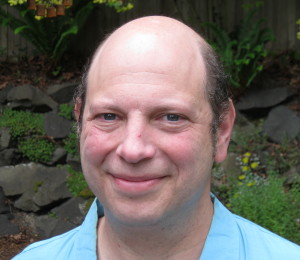
MENU
STIDS 2013 Home
About--
Topic list
Program Cmte
Venue & Local info
Registration
Sponsors
Program--
Keynote Speakers
Tutorials
Agenda & Papers
Download Agenda
Proceedings
Call for Papers
Important dates
Submission details
Download CFP
Attendees
C4I
Home

SEMANTIC
TECHNOLOGY FOR
INTELLIGENCE,
DEFENSE, AND
SECURITY
|
Dr. Benjamin Grosof
Date
Title
|

|
We present recent results on semantic web knowledge representation & reasoning, and knowledge acquisition, that tightly
combine highly expressive rules and ontologies specified semi-automatically -- yet rapidly -- by starting from effectively
unrestricted English text. The knowledge employs a new logic, Rulelog, that has strong capabilities to express meta
knowledge. Rulelog permits higher-order logic formulas that are defeasible (i.e., can have exceptions). It is rich enough
to serve as a relatively direct target for natural language processing, using Textual Logic, a new method that employs
logic-based mappings in natural language (NL) text interpretation and text generation. Rulelog also leverages its meta
capabilities to achieve computational tractability via restraint, a new form of bounded rationality.
Rulelog, and the Textual Logic that leverages it, constitute a pretty radical step forward in terms of fundamental
capabilities in semantic tech, with a number of advantages including in the social scalability of knowledge authoring and
reuse. Yet this step is incremental relative to legacy technology, in that the new knowledge representation transforms into
the same fundamental logic as used in relational and RDF databases and in commercially predominant business rule systems.
It's applicable in several intelligence, defense, and security (IDS) areas including: info access policies (e.g.,
confidentiality, compliance); info integration, flow and ontology mapping (e.g., in situation awareness); modeling of
causal events and risk; intelligence analysis and debate; e-learning (e.g., just-in-time training); contracts (e.g.,
compliance); question-answering (QA); and NL-based human-computer interaction (HCI).
We discuss some of the
exciting opportunities and challenges.
Benjamin Grosof is an industry leader in knowledge representation, reasoning, and acquisition. He has pioneered semantic technology and industry standards for rules, the combination of rules with ontologies, the applications of rules in e-commerce and policies, and the acquisition of rules and ontologies from natural language (NL). He has had driving roles in RuleML, W3C RIF (Rule Interchange Format), and W3C OWL-RL (rule-based ontologies). He led the invention of several fundamental technical advances in knowledge representation, including courteous defeasibility, restraint bounded rationality, and the rule-based technique which rapidly became the currently dominant approach to commercial implementation of OWL. He has extensive experience in machine learning, probabilistic reasoning, and user interaction design.
Dr. Grosof has experience applying core technology for knowledge, reasoning, and related HCI in a wide variety of
application areas, including: trust/privacy/security, contracts, compliance, legal, and services engineering; financial/
insurance services, risk management,and regulations; defense and national intelligence; biomedical research; and data/
decision analytics. From fall 2007 to early 2013, he led a large research program in Artificial Intelligence (AI) and
rule-based semantic technologies at Vulcan Inc. for Paul G. Allen; this centered around the SILK system for highly
expressive, yet scalable, rules. Previously he was an IT professor at MIT Sloan (2000-2007) and a senior software
scientist at IBM Research (1988-2000). He is president of the expert consulting firm Benjamin Grosof & Associates
founded while he was at MIT, and co-founder of the recent start-up Coherent Knowledge Systems.
His background
includes 4 major industry software releases, 2 years in software startups, a Stanford PhD (Computer Science), a Harvard
BA (Applied Mathematics), 2 patents, and over 50 refereed publications.
|
Dr. Jeffrey Morrison
Date
Title |
 |
Decision makers in operational environments are often surprised by emerging events and have little time to give deep
consideration to alternative courses of action before being forced to make a decision. Decision support has evolved over
the last 20 years but even today, decision support tools do not dynamically adapt to a decision maker’s context. This
often results in less than optimal decision making. Recent advances in the fields of cognitive science, the mathematics of
decision science, human behavioral modeling, team decision making, knowledge creation and transfer, mental model processes,
semantic techniques and human factors present new opportunities to create decision support that is context sensitive, and
potentially, proactive. To accomplish this, a systematic exploration of the role of context needs to be studied in decision
support systems that enable operational decision making.
Decision making is challenging for a number of reasons. Finding and integrating decision-relevant information is hard.
Context is often absent, implicit, sparsely or poorly represented in task environments requiring its laborious and
error-prone internal reconstruction by decision makers. The modern pace of operations often means that warfighters
find themselves engaging in tasks in ways, and in combinations, for which they hadn’t planned, and for which
they may not be prepared. This forces decision makers to multi-task amongst many competing and often conflicting
mission objectives concurrently.
Next generation decision support will not just “get the decision maker in the ball park” but will be
proactive in trying to “keep the decision maker in the ball park” throughout the process despite
the high levels of uncertainty and highly dynamic environments. At the center of this new research initiative is the
idea that we can develop technologies that are contextually aware of a decision makers’ missions and tasks. It
is asserted that algorithms can be developed that effectively anticipate the decision and information needs of decision
makers, in many kinds of task environments. Algorithms would then enable the timely presentation of information.
Enabling machines to dynamically model and share context with the human decision makers will be key to enabling
Proactive Decision Support (PDS). Such decision support will enable the recognition of changes in the environment
and the implications for shifting priorities for decisions that could address operational complexity and make
enable decision makers to make more optimal decisions, faster.
Dr. Jeffrey G. Morrison joined ONR’s Human & Bioengineered Systems Department (341) as a Program Officer in January, 2011 where he leads the Command Decision Making (CDM) program. The program is conducting Basic & Applied cognitive science research for application to individual & group decision making. The current operational focus is on multi-echelon Command & Control. The science focus is on developing Proactive Decision Support tools (PDS) that are aware of mission and tasks context as well as the facilitating the development of a science of Context-Driven Decision Making (CDDM). Prior to coming to ONR, Dr. Morrison was a Engineering Psychologist / Cognitive Scientist with the Space and Naval Warfare Systems Center – Pacific (SSC Pacific) for 17 years. He was most recently embedded as a Navy Scientist with the Combating Terrorism Technical Support Office (CTTSO) where he served as Chief Scientist to the ASD RDT&E sponsored Human Social Culture and Behavior Modeling Program (HSCB). During 2007-2008, Dr. Morrison was detailed to the Director of National Intelligence where he served as an IARPA Program Manager studying the analytic process and the potential application of virtual world technologies to enable it. Dr. Morrison was a senior scientist supporting several DARPA projects, including the development of user-composable automation for Maritime Domain Awareness (FastC2AP), Predictive Analysis for Naval Deployment Activity (PANDA), and the Augmented Cognition program. He also was principle investigator for numerous ONR sponsored projects, including: Knowledge Web (K-Web), and Tactical Decision Making Under Stress (TADMUS). Dr Morrison has been the recipient of numerous professional awards including: The 2005 Jerome H Ely Award for Article of the Year in the Journal of Human Factors; the 2004 ONR Arthur E. Bisson Prize for Naval Technology Achievement; and the American Psychological Association - Division 21, George E. Briggs Award for Original Research.
